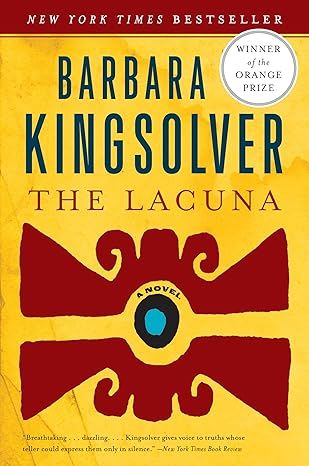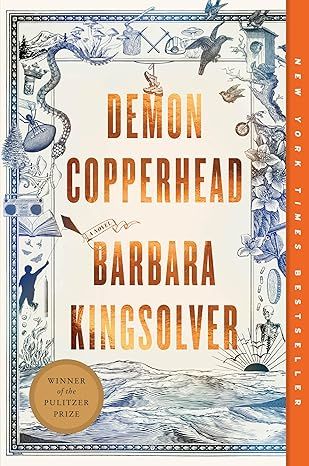Flight Behavior: A Novel
4.3 out of 5
9,479 global ratings
New York Times Bestseller
"An intricate story that entwines considerations of faith and faithlessness, inquiry, denial, fear and survival in gorgeously conceived metaphor. Kingsolver has constructed a deeply affecting microcosm of a phenomenon that is manifesting in many different tragic ways, in communities and ecosystems all around the globe.” — Seattle Times
A truly stunning and unforgettable work from the extraordinary New York Times bestselling author of The Lacuna (winner of the Orange Prize), The Poisonwood Bible (nominated for the Pulitzer Prize), and Animal, Vegetable, Miracle
Flight Behavior is a brilliant and suspenseful novel set in present day Appalachia; a breathtaking parable of catastrophe and denial that explores how the complexities we inevitably encounter in life lead us to believe in our particular chosen truths. Kingsolver's riveting story concerns a young wife and mother on a failing farm in rural Tennessee who experiences something she cannot explain, and how her discovery energizes various competing factions—religious leaders, climate scientists, environmentalists, politicians—trapping her in the center of the conflict and ultimately opening up her world. Flight Behavior represents contemporary American fiction at its finest.
448 pages,
Kindle
Audiobook
Hardcover
Paperback
Audio CD
First published June 3, 2013
ISBN 9780062124272
About the authors
Barbara Kingsolver
Barbara Kingsolver was born in 1955 and grew up in rural Kentucky. She earned degrees in biology from DePauw University and the University of Arizona, and has worked as a freelance writer and author since 1985. At various times she has lived in England, France, and the Canary Islands, and has worked in Europe, Africa, Asia, Mexico, and South America. She spent two decades in Tucson, Arizona, before moving to southwestern Virginia where she currently resides.
Her books, in order of publication, are: The Bean Trees (1988), Homeland (1989), Holding the Line: Women in the Great Arizona Mine Strike (1989), Animal Dreams (1990), Another America (1992), Pigs in Heaven (1993), High Tide in Tucson (1995), The Poisonwood Bible (1998), Prodigal Summer (2000), Small Wonder (2002), Last Stand: America's Virgin Lands, with photographer Annie Griffiths (2002), Animal, Vegetable, Miracle: A Year of Food Life (2007), The Lacuna (2009), Flight Behavior (2012), Unsheltered (2018), How To Fly (In 10,000 Easy Lessons) (2020), Demon Copperhead (2022), and coauthored with Lily Kingsolver, Coyote's Wild Home (2023). She served as editor for Best American Short Stories 2001.
Read more
Reviews

N. Boer
5
Wonderful writing
Reviewed in the United States on November 12, 2012
Verified Purchase
This is a genuinely beautifully written novel - Kingsolver has mastered the art of the evocative sentence, the witty turn of phrase. But more than that, it is her characterization that carries the reader and turns this potentially preachy novel into a page-turner. Here, her focus is on small-town Appalachia, and her characters ones which, in other novels, would be sketched as ignorant Bible-belt hicks. The protagonist even references "Deliverance" to indicate the way these towns have been depicted. Instead of judging these characters, however, we are offered a very convincing window into their worldview, such that at the end of the day, it is the scientists and world-wise media who come across as unsympathetic and prejudiced.
But by entering this worldview, Kingsolver runs the risk of coming across as patronizing - and occasionally, especially towards the latter half of the novel, she does fall into the trap of oversimplification. The line between the characters and the reader becomes dangerously blurred, for example in her explanation of the phenomenon of the butterflies to pre-schoolers, to which we, the readers, have to listen to. We are thus presented with the same explanations and thoughts on this strange occurrence (why the butterflies are over-wintering in Appalachia rather than their usual spots in Mexico), and on climate change in general, several times during the novel, at various levels of complexity. It is as if Kingsolver is convinced to bridge the same gap she depicts in the novel, between the scientists and the so-called 'hicks,' amongst her readers, such that anyone picking up this book will leave with at least a basic, pre-school level understanding of climate change. This is admirable, but potentially misguided - generally speaking her target audience is not going to be low-information readers (especially since this book retails at almost $15). Thus the novel becomes increasingly repetitive, especially as all of the major character development happens early on - there are certainly some surprises in the second half, but the character arc of all the main figures is set within the first few chapters.
The butterflies themselves become a character in the novel, and you find yourself passionately rooting for their survival. The main event depicted in the novel (the displacement of the butterflies from their usual roosting place in Mexico to southern Appalachia) is fictional, although parts of the story are based on true events (the destruction of a Mexican mountain town through flooding, for example), and all of the examples of "global weirding" are eerily within the realm of possibility. Kingsolver is clearly passionate about the issue of climate change, and this is a powerful novel making a crucial intervention on this subject.
You will leave this novel, probably having learnt new facts and theories, but definitely having extended your comfort zone and challenged your own prejudices.
Read more
17 people found this helpful
Patti
5
great message, great book
Reviewed in the United States on September 16, 2014
Verified Purchase
Dellarobia is on her way to a hunting cabin to meet the telephone man for a tryst, when she encounters an astonishing scene in the Appalachian mountains. The trees appear to be covered in flames, but there’s obviously no fire. This vision, which is really hordes of monarch butterflies, gives her pause to rethink her plans. She turns back to her unhappy life with a passive husband and two small children on a sheep farm owned by her in-laws. Mother-in-law Hester is a taciturn woman who seems chilly toward her own grandchildren and downright hostile toward Dellarobia. Near the end of the book we find that she has her reasons for such a dismal outlook on life, but, in the meantime, the butterflies become a national sensation. Ovid Byron, a scientist/professor from Arizona, sweeps in with a few assistants to try to determine why the butterflies have chosen to roost in Tennessee, where the winter cold will surely kill them and possibly annihilate the entire species. The author uses this fictional phenomenon for two purposes. First, Ovid becomes a vehicle for educating the locals about global warming, which they’ve heard of but don’t believe in. The second purpose is that of providing a metaphor for opening up the outside world to Dellarobia and her young son Preston. It’s a minor miracle how the author touches on so many themes in this book. Dellarobia bristles at the condescending attitude held by both the scientific community and the press toward her neighbors, but she’s a quick study and soon grasps the gravity of the situation for the butterflies, as a microcosm of a planet whose ecosystems have gone awry. Kingsolver’s prose is luscious, never preachy, and the dialog is crisp and witty. An outsider handing out pamphlets, admonishing people to reduce their carbon footprint, gets a rude awakening when he recites his list of suggestions to Dellarobia. She’s never been in a plane, has never bought bottled water, and hasn’t eaten in a restaurant in two years, demonstrating that her contribution to the problem is meager in comparison to that of urban dwellers. Despite its weighty topic, this novel has a lot of heart and humor, and I embraced everything about it with delight.
Read more
2 people found this helpful
Anna Haning
5
Inspiring story
Reviewed in the United States on January 8, 2013
Verified Purchase
I picked this ebook for light reading during a few hours flight to Singapore and I expected a typical chick flick, no real attention grabber, nothing serious or worth remembering. I didn't know the author had a scientific background which comes in handy later on in the novel. In the beginning and sometimes in the middle of the story I found the main character Dellarobia (yeah, right, what a name) mildly annoying. Nor because she may have been up to something silly, I could understand her reasons for lack of respect toward her husband, being fed up with harsh and limiting small town reality, her mother in law's attitude toward her etc. etc. and lack of opportunities to pursue education in spite of her capabilities. Loss of both her parents, unwanted teen pregnancy, loss of a baby, poor deprived existence under the iron fist of her in-laws', being full time mom of two young kids - these were all legitimate reasons for her not to be able to make something of herself and to always want a different life. Yet somehow it did not persuade me completely that she was a victim of circumstances - it was her choice to marry the dumb gutless guy who got her pregnant and settle for the pathetic existence he could offer, it was her choice to mother two other of his kids and raise them (that she never regretted to her credit) and as hard as it was she should have pursued college and a career. She could blame circumstances only to a degree. Luckily for her though an unexpected twist of events brought so much radical change to her life that almost everything she ever dreamed of began to materialize in her modest limited reality. And she redeemed herself fully big time. Also her mother in law, rather strong figure in the book, had quite a fascinating and a surprising story to tell... it was very well presented, in a way that's both touching and believable. The happy ending is bitter sweet as the disaster strikes, yet both her and others manage to survive. Nothing's too sugar-coated nor an easy step to take yet it is a very good inspirational story. I didn't mention another sort of multi-hero of the book, the monarch butterflies. The disaster in their little world started all the change in Dellarobia's. And in spite of facing death and failure they both came out triumphantly not without some loss and sorrow yet with hope and survival story to tell. I had Dellarobia in my mind for quite a long time like someone quite worth remembering.
Read more
Rita Sydney
5
Another Winner
Reviewed in the United States on April 20, 2013
Verified Purchase
In this book the scenes between people reminded me of those in the books of Anne Tyler. Everyday kind of folks who manage to get along in the humdrum of daily life amidst children and spouses and in-laws. There's misunderstanding and frustration and guilt but also moments of compassion and lots of humor.
Dellarobia Turnbow is smart but uneducated, married 10 years to a gentle but dimwitted soul because of a pregnancy when they were 17. She feels restless but trapped by past choices, her natural curisoity always tamped down, living on the Turnbow land at the mercy of her in-laws.
So bogged down is she in the raising of 5 year old Preston and 18 month old Cordelia, shopping at the dollar store with what little her husband, Cub, earns from irregular work laying gravel, she's grateful for a cut of lamb when her mother-in-law culls a sheep from their flock. The only future Dellarobia sees for herself is more of the serial obsessive crushes she develops toward good-looking men who happen along.
When the story opens Dellarobia is climbing the land behind her farm on her way to meet the latest man, a telephone repairer, ready to cross into outright adultery.
As she hikes, in a area seldom visited she comes to a valley and sees on the opposite side of the mountain trees covered with strange clumps. It's an overcast day and as the sun begins to come from behind the clouds the clumps suddenly explode into color. It advances up and down the valley and mountainside. There's no roar, no smoke, none of the sounds of a conflagration yet the trees seem to be on fire.
Dellarobia thinks of her kids. What would become of them if something happened to her. She thinks of her telephone man and realizes how he probably would't even miss her.
As she watched the glowing trees "fascination curled itself around her fright. This was no forest fire....This was not just another fake thing in her life's cheap chain of events, leading up to this day of sneaking around....Here that ended. Unearthly beauty had appeared to her....It looked like the inside of joy....It had to mean something."
Dellarobia is a religious skeptic and scorns superstition. She knows she's not "important enough for God to conjure signs and wonders on her account" and yet she's awed that the vision she's witnessing as more powerful than her obsession with the telephone man.
She returns home. "A lake of fire had brought her back here to something." She's not sure what but she feels a change in herself.
This book would be a satisfying story were it only about what happens to Dellarobia as the world comes to see this infestation of monarch butterflies, the billions that have migrated to this Appelachian mountain for unknown reasons.
Barbara Kingsolver, however, writes with bigger themes in mind. In Flight Behavior it's the effect climate change has on people whether or not they are ready to face a changed reality.
Among the curious who come into Dellarobia's world is Ovid Byron, a scientist whose life work has been the study of the monarch butterfly. The Turnbow's let him, for a fee, park his camper out back in order to be on site with some of his grad students to study the butterfly phenomenon.
Dellarobia, drawn to Ovid, recognizes the signs of her habitual crushes, but stronger still is the effect he has on her mind and her self-image. She sees too the influence the scientists have on her precocious son.
Dellarobia was sure that vision on the mountain had to mean something in her life. The reader watches as that meaning comes to be. It's not a thunderstroke like the sudden burst of color she witnessed. It's more a process of her taking the elements of her life, her marriage, her kids and examining them in light of what she experiences through contact with the scientists. She sees she has options, past choices don't have to limit new ones.
There's a telling scene when Ovid comes to dinner with the Turnbows. He's brought his wife who's paying him a visit. Dellarobia is prepared to be jealous but instead, seeing how the couple regard each other, she realizes what marriage could be like.
At the end of the book Dellarobia has made some decisions. She is taking control of her life. After a rainy year, a culminating storm results in a flood. Circumstances have happened to put her on some high ground behind the farm and she watches as the flood sweeps all below.
A satisfying image is left to the reader of Dellarobia on that bit of ground above the flood, both literally and figuratively with a secure foundation on which to build her new life.
Read more
7 people found this helpful
tiffgall
5
***SPOILER ALERT*** I really enjoyed reading Barbara Kingsolver’s Flight Behavior
Reviewed in the United States on April 15, 2015
Verified Purchase
SPOILER ALERT
I really enjoyed reading Barbara Kingsolver’s Flight Behavior. Yes, it was really dense and I think some parts of it could’ve been shortened, but I really liked the critiques on society’s inaction and denial of climate change throughout the book. I also enjoyed the different stories woven in throughout it such as Dellarobia’s infidelity, her feeling trapped in her life, and the overarching theme of the monarch butterflies serving as a warning for climate change.
I think Dellarobia’s infidelity springs from her feeling trapped in her life. Everyday is the same: pinching pennies, changing diapers, lying down next to a husband you’re not in love with, and maybe never were to begin with. Who wouldn’t be miserable? There were several instances in the beginning of the book (and mostly in the beginning, since in the latter she discovers she has more agency than she realized) where Kingsolver explains Della’s feelings of wanting to get out of her life. Dellarobia also had to make a lot of compromises, like going to church when she had little desire to do so. It feels like for the most part, until she actually becomes involved in helping with the butterflies, Della feels that the only way she can escape her life is through cheating, or thinking about cheating. I’m not sure if that’s a fair assessment, because it’s a lot more complex than that, but it’s not until the very end when she sees how happy Ovid is with his wife Juliet that she drops her dreams of being with him and realizes that there are other ways to escape her life than by getting emotionally attached to another man.
I think another component that aids in her feeling trapped is Cub. Even though she bosses him around for a good portion of the book, there are still a lot of gender roles at play. Like when she’s talking to Dovey and saying that Cub wouldn’t want her working because it would be a negative reflection on Cub as her husband and as a man (190). Her having a job really shouldn’t affect Cub’s manhood, but it does, so she feels trapped into continuing on as a stay-at-home mother until Dovey convinces her otherwise. It’s not until she actually obtains a job and is progressing through it that her family starts to respect her, even Hester. And of course, the possibility of splitting up their family, one that she seems to question at times, is another thing that keeps her from leaving in the beginning. It’s obvious that she loves her kids, but love doesn’t always stop you from asking huge ‘what if’ questions about your life.
Then there’s money and the lack of it. When Dellarobia is talking to Ovid about the failing educational system in her town, and the about the irrelevance of college for kids from her town, it’s really disheartening, and I think one of the most important parts of the book. It seemed like upward mobility in the town was severely limited if you weren’t an athlete in school, whom Della notes as having the town in their hands (223). She says to Ovid, “Doctor of all the sciences, Harvard and everything… there’s not room at the top for everybody. Most of us have to walk around in our sleep, accepting our underprivileged condition” (225). The acceptance of this stunts anyone’s agency and it obviously stunts Dellarobia’s until the end when she realizes that it’s not too late for her to go to college and do something else with her life.
And finally, climate change. The book centers around the town’s complacency with some serious warning signs. Of course the butterflies that everyone wants to regard as miracle are abnormal. Then there’s the constant raining and flooding, which throws off their wool production. Still, the people of her town are in active denial and it’s most easily seen through Cub and through Dellarobia as well. Cub dismisses it in a biblical sense, saying that only God can control the climate. Ovid and Della’s conversation steers more in the direction of her just ignoring the signs. She says to him, “They say it’s just just cycles… that it goes through this every so often” (281). The inaction and denial from the people of the town comes from them claiming that there’s no visual evidence. As of yet, these peoples haven’t been tragically affected by climate change, besides the raining, which they choose to see as ‘just a cycle’. Because of this denial, it makes it all too easy for people to say that climate change doesn’t exist. You hear about it on the radio, see it on the news, but if it’s not actively affecting your daily commute to work or school, then it’s easy to act like it’s not that bad. We all do it. The butterflies that are at the crux of the story serve as a warning that something is coming and that things are changing. But throughout the book, there is still denial, because the butterflies are just so beautiful to look at.
Read more
23 people found this helpful
Book Addict
5
Enjoy the dance of a talented author
Reviewed in the United States on April 18, 2013
Verified Purchase
For months the book sat in my "to read" pile. Then I pulled it out and placed it on the coffee table. It teased me as I savored the anticipation building to the moment I opened the cover and began reading the poetry of Barbara Kingsolver's prose.
Flight Behavior, Kingsolver's latest novel, did not disappoint me from the first word to the last, although there were some plot techniques that disconcerted me.
The environmental theme interwoven throughout the plot was executed with a unique choice of characters as the mouthpieces. Using the monarch butterfly as the harbinger of ecological disaster captivated me from the first description of the main character, Dellarobia, when she encounters the unusual sight of thousands of monarchs clustered on tree limbs at the top of a mountain in Appalachia. She believes she's seeing the apparition as a warning against the adultery she's is about to commit, until her epiphany on the mountainside. Here's the vision from Dellarobia's viewpoint:
"Unearthly beauty had appeared to her, a vision of glory to stop her in the road. For her alone these orange boughs lifted, these long shadows became a brightness rising. It looked like the inside of joy, if a person could see that. A valley of lights, an ethereal wind. It had to mean something."
Kingsolver received criticisms for her "preachy" tone on climate change. Readers who love her previous works, yet disagree with her politics in this novel, gave her harsh scores and reviews.
I'm reviewing this book on its merits. But be forewarned - this book is entertaining and educational, if you want it to be. If however you're the type of person who doesn't wish to read anything other than what repeats what you already know and believe and if you believe the claims by scientists of climate change are bogus, don't read this book. You'll learn nothing and walk away muttering about the "tree hugger" author.
I loved the book for creating a fictional "what if" picture. What if the monarchs, so unsettled by climatic changes in their wintering spot in Mexico, decided to roost in the Appalachian Mountains?
Kingsolver creates a main character in Dellarobia who is a victim of her decisions in life and her circumstances. But never once did I feel sorry for this young mother burdened with the grief of the unmentioned dead baby that tied her down to the husband who is clearly not her match made anywhere. Dellarobia is going through her own "climate change" as she becomes an assistant to the scientists who have come to the mountain to study the anomaly. She becomes our interpreter of the complicated nature of shifting atmospheric patterns and the potential destruction of an entire species. The plot is woven around Dellarobia's problems and that of the monarchs.
One of the foils for Dellarobia is her mother-in-law Hester who is very unsympathetic and seemingly mean in the first half of the book. As Hester's story unfolds, Kingsolver is able to deftly turn Hester into a completely sympathetic human character, flaws and strengths both on display.
I didn't like the transition between chapters. Often, Kingsolver would bring the reader to the brink of a breakthrough in discovery of both the human drama and the plight of the monarch, and then the chapter would end. I would eagerly begin the next chapter only to find the plot had moved ahead a few days. I also felt the ending was very quickly tied up in a nice little bow. Some of it was symmetrical, but much of it seemed as if Kingsolver was told by her editors to shorten the book so she rushed the resolution.
Even with the few things I found disconcerting, I would still recommend this book if for nothing else than to enjoy the beauty of a skilled writer dancing her dance for our enjoyment. See for yourself:
"A movement of clouds altered the light, and all across the valley, the butterfly skin of the world transfigured in response, opening all the wings at once to the sun. A lifting brightness swept the landscape, flowing up the mountainside in a wave Dellarobia opened her mouth and released a soft pant, anticipatory gusts of breath that could have become speech or laughter, or wailing. She couldn't give it shape."
Read more
3 people found this helpful
Celeste Johnson
5
An important novel - sharp-witted, colloquial, and delightfully entertaining
Reviewed in the United States on February 18, 2024
Verified Purchase
A portrayal of characters that in the beginning are flawed, but sympathetic in their relatedness of the human condition in misguided pursuits and attempts at redemption. It’s descriptive in painting a realistic image of the place set in rural Appalachia. The astute observations of the protagonist, Dellaboria and her sharp-witted discourse is often sprinkled with brilliant insights despite her lack of formal higher education. There is humor woven throughout a rich tapestry between the colloquialisms and a deeper concern for the characters as they contemplate such things as a ‘person of worth’. The stark contrast between perceptions about the college educated surface when she hosts Dr. Byron and become more intertwined as a team of academic researchers delve deeper into the ecosystem. It’s timelessness is such that without a few anecdotal references to pop-culture such as her pair of Crocs, and graduating music preferences from Michael Jackson to Coldplay, and the shocking reveal that she didn’t own a computer it may otherwise be lost - out of a page of history, which add to the complexity. Similarly, the two discuss climate change denial over a glass of Reisling before she remarks they were like rebel flags on mudflaps - the science illiterate. An important novel, and delightfully entertaining, as these issues become more pervasive and severe in bridging awareness and perspectives.
Read more
D. K. Bagshaw
4
A flash of inspiration
Reviewed in the United States on November 14, 2012
Verified Purchase
After nearly sixty years now, I had never bought a new, hard-back first edition. But when I heard about Flight Behavior, I decided to make an exception. I placed an advanced order for it over Amazon, and was rewarded when I eagerly opened the package and placed my fingers on its exquisitely, perfectly-designed cover jacket - little embossed leaves of blue surrounding the title and the author's name. Opening the book I discovered a flash of bright orange on the inside of the covers and with it an excitement greater than I've ever felt about reading a book. Perfect preparation for the flame of revelation I was anticipating. Why blue and not brown? I wondered after reading the first chapter. Ah, but the hottest part of the flame is blue.
The first chapter read like a Greek tragedy with Biblical underpinnings as only Kingsolver can do. A contemporary novel, yet the heroine reminded me of me in the seventies and I wondered if there were still women like that today. I thrilled at her transformation already occurring in chapter two. Off to a good start . . .
And who can resist descriptions such as Dellarobia's son popping out of the school bus like a gumball or her first glimpse of the tall lanky scientist, Olvid, emerging from his little car unfolding like a contractor's measuring stick?
The challenge of the novel is that it's didactic, a controversial subject, but well-handled. Rather than making it a message book, Kingsolver presents a complex situation, tossing up pat answers and then blasting them. It reminds me of a G.B. Shaw play -- each character representing a different viewpoint on the environmental stage. Yet all are seen through Dellarobia's eyes and almost all are well-rounded, dynamic characters, especially our heroine. Kingsolver's characters are archetypes but not stereotypes like the progressive (rather than evangelical convervative) minister who is building a mega-church. And though you can tell with whom the author's sympathies lie, she does of fair job of representing all -- with the exception of the media, whom she joyously lampoons.
In the end, for me, the novel fell short of five-stars. Too many problems, though most of them minor. A couple of sentences I couldn't even understand. Loose ends that bothered me. After a long and painful scene (and to me out-of-character) of a fight with her husband in the dollar store, she finally purchases a monarch pot holder "for her son," but we never see if she gives it to him or even hangs it in her kitchen. And when Dellarobia discovers the first tag and the junior scientists thrill she's found it, but don't say where they had tagged it, and don't mention it to Olvid when he comes on the scene. At one point Olvid talks about the possible extinction of the Monarchs, but never mentions the California population, nor do the 350.org volunteers from California. Not until near the close of the book do we hear of it.
The author builds up sexual tension between Dellarobia and Olvid, yet when we finally see them alone under a tarp in the rain, they simply have a scientific discussion. I wanted at least to see them together for a final scene before he leaves. Instead we get a revelation about the minister which seems contrived and not that important anyway. The Mexican family seems shoehorned into the story - too much of a co-incidence that they migrate there before the butterflies do. Also, Dellarobia's son seems more like an eight-year old than a kindergartener and her daughter seems more like twelve months than eighteen.
But when I step back from the flaws, I see a lively, colorful, engaging book. Highlights for me were the scene of revelation from Dellarobia's mother-in-law, the media charmer's interview of Olvid, the knitting ladies from England, the old codger who tries to get Dellarobia to take "the pledge." Well worth the read.
Read more
5 people found this helpful
mark jabbour
4
about more than butterflies and climate change
Reviewed in the United States on January 8, 2013
Verified Purchase
Why bother. Why bother to write, to read, to write about what you read? Does anything matter or is it (human behavior) just something that happens regardless of our thoughts and intentions? Are we no more in control than insects? Why bother. Barbara King-solver's (haha) latest novel is about those questions; and she's hardly the first. I can draw a line from Ken Kesey's Sometimes A Great Notion (1964) to Michael Crichton's State of Fear (2004) to Jonathan Franzen's Freedom (2010) to Kingsolver's Flight Behavior (2012) and make an argument - either yes or no. On the surface all four novels are about environmental and human issues and their interaction: logging & unions, global catastrophe & corruption, strip-mining & bird watching, butterflies & global warming, & growing up, growing into yourself; but all four books are far more than what they are on the surface. They are more than story, characters, and craft - they are influence, some of which the authors likely had no idea of when they were writing and thinking and imagining. Of the four, IMHO, Kesey's is the best - maybe the best novel ever written; Crichton's was the most effecting and ironically, probably had the opposite effect of what he intended--was the most damaging; Franzen's, again ironically, the most forgettable; and finally, ironically, Kingsolver's at once both the smallest and biggest, the most hum-drum and most interesting.
I almost quit her this time. I just wasn't that into the story. It was humdrum - about people, a protagonist, a place, not all that engaging for me. But I didn't. This is the fifth novel of Kingsolver's that I've read, so I must like her, right? What I like is the way she thinks - her curiosity and imagination. Not so much her style or voice. Too many similes. If you were to take out the word "like," the page count would substantially be reduced. So what is Kingsolver curious about here that finally caught up with me and grabbed my attention? It was the clash of worldviews that so dominates the politics of people today. It happened on page 138 with this: "How strange, she thought, to see the forest floor laid bare that way. It gave the impression of the earth as basically just a rock, thinly clothed." See that? A metaphor for the story without simile: How one woman, trapped in a world by birth, not choice, was impacted by an unusual event, and then an opportunity to break out; and her struggle with the clash of worldviews thrust upon her. It was the ignorant, simple, incurious, religious interpretation and understanding of the world of a small, rural Appalachian town getting smacked in the face by the informed, curious, scientific, unstable and uncertain outside world that is. Dellarobia, the 28 year-old, married (to a dull man) with young children, protagonist comes face to face with the fact that she is not a simple minded girl, but a smart and curious creature who must leave- if she, her soul, is to survive -take flight, if you will. Flight behavior.
Flight Behavior is a story that, many times, brought water to my eyes. It was the imprisonment of poverty and the unsophistication of the town and the family that she had married into that got me sympathetic. I felt for her and her children. She did not belong (she was orphaned early) but did not know what was wrong until the event and the outside world presented itself. What, for me, is sad also is that even though Kingsolver does a nifty trick in getting things to a hopeful end - I know that that is just a nifty literary trick. In the real world things are more grim, and that the best hoped for outcome is what people usually do - just muddle through, staying alive but not thriving.
You want proof of that? Take Kesey's great novel, written in the early 60's with his "heroic" Stamper family, led by Henry and Hank, father and son, carving out a life in the Northwest by logging, with no regard for the larger world. Now we have Kingsolver's novel, written 44 years later, with the "heroic" Turnbow family, Bear and Cub, father and son, carving out a meager existence off the land, with no regard for the larger world - and in each instance the women have no say, their purpose being only to bear children, cook and clean, and support the men. This narrow, "natural," worldview still persists over much of the world and much of this country.
It seems to me that a progressive, naturally evolving, worldview peaked in the 70's; and that there has been a slow, but gaining, regression back to the `old ways.' Thus, while I was rooting for Dellarobia and glad that Kingsolver ended the story the way she did. The "Story" doesn't end there. The pull of the herd is great, and to try and break away and "improve" yourself is, while admired and cheered, is rare and getting harder.
More evidence? Before Crichton's novel it appeared that we (humans, the educated) might be able to head off global warming; but that one novel seemed to be just the thing needed for the herd to reverse course and go back. The book was waved in the chambers of congress as proof that the educated elitists (scientists, academics, and the media) were conspiring for personal gain, and lying to the herd about the negative consequences of unregulated and unrestrained use of resources. People just needed an excuse to say, "yes, that's the world." The world's the way they believe it is.
Franzen's novel? More evidence of the negative consequences of the `old ways' being cast aside for new ways, despite, as I said, being a forgettable story - it was widely hailed and read. There was not a "happy ending." The Burglund's, the heroic family, and society just barely muddled through.
So, why bother? Are we simply tethered to our fate, which is determined by our history - events that have so much momentum there is no sense in trying to break away. As Henny Stamper tells Viv, Hank's wife, "Why there's eating and sleeping and working and fighting and screwing - that's all there is." And Kesey tells the reader: " ... there is solace and a certain stoical peace in blaming everything on the rain, and then blaming something as uncomfortable as the rain on something as indifferent as the Arm of the Lord." (p.382) And Kingsolver tells the reader: " ... the Lord moves in mysterious ways." (p.43)
Why bother?
That's just what some of us do.
Read more
47 people found this helpful
Boukis Miliecus
3
Fine story, kinda preachy
Reviewed in the United States on July 6, 2024
Verified Purchase
If Demon Copperhead was a 10 on the Kingsolver scale, I’d put Flight Behavior at maybe 6 or 7. It’s a good story. The author writes amazingly well, has great human insight, and is relentlessly, hurt-you funny. After an accurate and not too baldly done lecture on the crucial difference between correlation and causation, though, we are assigned dunce caps for not automatically buying the magic science from the 70s that says co2 causes global warming. Is there no one who appreciates irony any more, just asking. And again, here’s an involved and not overly finger-waggy explanation that science is a quest for the next set of questions, and will never become a set of pat answers. Didn’t work for inquiring minds during the late great pandemic, but surely when it comes to something as amorphous, as impossible to measure, as huge and poorly modeled as the global climate— “NO. That’s Settled Science, you ignorant fool.” Sorry to question the cult religion, but climate change is not subject to World-is-Round-level proof. Even if it was, that science could not be done while dogma rules and all must bow to it. So yeah, really good story, if you can take yet another Rant of Supreme Certitude on behalf of The Science, lol.
Read more
Top Barbara Kingsolver titles

Homeland: And Other Stories
4.2
-
691
$5.24

Animal, Vegetable, Miracle: Our Year of Seasonal Eating
4.5
-
2,496
$7.96

Animal Dreams: A Novel
4.4
-
2,888
$10.49

The Lacuna: A Novel (P.S.)
4.4
-
4,450
$1.77

Prodigal Summer: A Novel
4.4
-
6,309
$8.99

The Bean Trees Anniversary Edition: A Novel
4.4
-
11,504
$2.41

Unsheltered: A Novel
4.2
-
12,750
$5.24

Demon Copperhead: A Novel
4.6
-
110,129
$16.99

The Poisonwood Bible: A Novel
4.5
-
16,256
$12.69
Best Sellers

The Tuscan Child
4.2
-
100,022
$8.39

The Thursday Murder Club: A Novel (A Thursday Murder Club Mystery)
4.3
-
155,575
$6.33

Sapiens: A Brief History of Humankind
4.6
-
140,302
$13.49

The Butterfly Garden (The Collector, 1)
4.3
-
88,556
$9.59

Things We Hide from the Light (Knockemout Series, 2)
4.4
-
94,890
$11.66

The Last Thing He Told Me: A Novel
4.3
-
154,085
$2.99

The Perfect Marriage: A Completely Gripping Psychological Suspense
4.3
-
143,196
$9.47

The Coworker
4.1
-
80,003
$13.48

First Lie Wins: A Novel (Random House Large Print)
4.3
-
54,062
$14.99

Mile High (Windy City Series Book 1)
4.4
-
59,745
$16.19

Layla
4.2
-
107,613
$8.99

The Locked Door
4.4
-
94,673
$8.53

